We’re pleased to release the Inform Direct 2021 Review of UK Company Formations.
Constructed using data from Companies House and the Office of National Statistics, our study represents the most thorough analysis of UK company formations and dissolutions in 2020.
As well as a national summary, we dissect the data for each nation of the UK and individual counties, allowing you to track the performance of businesses from Cambridgeshire to Cumbria.
You can drill down further and investigate the figures for individual districts and even wards across the country. You can also compare this year’s figures with those of previous years.
In this article, we look at what we’ve learnt about the state of UK business after the tumult of 2020.
A better way to form a new UK company
Inform Direct is the perfect tool to make forming a new UK company a whole lot easier:
> Easy, intuitive online process
> Great choice of packages and extras
> Excellent value for money
> Compliant documents, registers supplied
> Backed by dedicated, expert support
A surprising new record for company formations
There were 780,766 companies formed in the UK in 2020. Perhaps surprisingly, that’s an increase on the previous record, set in 2019, of 690,763 new companies.
Overall, that presents a positive picture, especially given the challenges posed by the pandemic. At least in more normal times, the number of company formations is often seen as a gauge of confidence among entrepreneurs and a measure of UK business health. With so many concerned earlier in 2020 that coronavirus would bring business to a complete halt, it is encouraging to see so many new companies being formed.
A large number of these new companies are in the retail sector, with many new businesses set up to sell goods and services online or locally, taking advantage of customers’ changing shopping habits during the pandemic. We also see a disproportionately high number of new companies created offering courier services, again capitalising on increased demand for such services since March 2020.
There were also people making the best of their time on furlough, using the chance to pursue an idea – albeit often only ever intended as a ‘hobby’ business – that previously was always out of reach.
Many stories behind new company formations are less positive. The pandemic and national lockdowns have meant that some existing businesses, including some big names, have already closed or significantly scaled back their operations. As we’ve seen in previous recessions, many of those people made redundant have set up their own ventures as an alternative way to earn a living.
There has also been much commentary, if somewhat less concrete evidence, about companies being formed specifically to access UK and local government help during the pandemic. Possibly, some existing sole traders and partnerships may have chosen to incorporate to access certain schemes. It’s also possible that some businesses – both incorporated and unincorporated – have been created overnight with the intention to fraudulently claim state aid. While we wait to see the results of inevitable investigations into such undesirable activity, the numbers are likely to be small overall.
More UK companies than ever before
With record-breaking company formation numbers, it comes as no surprise that there are more UK companies in existence – even though some are dormant – than ever before. The total number of UK companies was 4,837,426 at the close of 2020. That’s up 8.2% in a year and, over five years, the number of UK companies in existence has increased by 28.7%.
As well as record numbers of new company formations, the increase in the UK business population has been driven by the impressive survival rate of existing companies. The number of company dissolutions across the UK – 418,427 during 2020 – was the lowest annual figure since 2015.
It remains open to debate whether this positive trend will endure, particularly when the support provided to businesses during the pandemic is withdrawn. Many new enterprises set up in 2020 might also be short-lived, as people return to full-time employment or struggle to take the business to the next level.
A varied regional picture – with growth led by England
The pattern of record-breaking formation figures was widespread if not universal. All-time high company formation figures were recorded in Hampshire in the south and Northumberland in the north, as well as both urban Manchester and rural Shropshire.
Having said that, we still saw significant regional variations between different areas of the UK:
England led the growth in companies, with a new record of 697,446 new businesses compared to the previous highest of 613,316 the previous year. But England led not just in raw numbers, as would be expected. The 8.3% growth in the English company population was the highest figure of the nations of the UK. With 13.1 new companies for every 1,000 people, England also had the highest growth when the figures are adjusted for population.
London continues to dominate company formation activity in England. Of the 697,446 formations in England in 2020, 270,114 – well over a third – were in London. Alongside local access to widespread infrastructure, suppliers and customers, many companies are still attracted by the idea of having a registered office address in the capital, even if they do most or all their business elsewhere.
Outside London, the busiest areas for new company formations in England were the West Midlands (37,202), Greater Manchester (36,288), West Yorkshire (22,615) and Essex (19,277). Only six English counties saw the number of company formations fall between 2019 and 2020, with new records set in the majority of counties. And only a single county – Dorset – witnessed a decline in the corporate population in 2020.
Wales saw a modest increase in company formations, with 19,601 new companies registered compared to 18,635 in 2019. Although the increase in formations was small, Wales also witnessed a significant reduction in companies dissolved – 14,340 in 2020 compared to 17,756 in 2019 – which meant overall the company population increased by an impressive 6.9%. Several areas, including Carmarthenshire, Neath Port Talbot and Blaenau Gwent, experienced growth in excess of 10%.
Northern Ireland experienced a mixed year, with slightly lower company formations – 8,477 compared to 8,676 in 2019 – but a steady increase in the population of limited companies. Reduced numbers of dissolutions meant the total of companies increased 5.7% to 70,199 at the end of 2020. When the figures are adjusted for population, Northern Ireland still lags behind other nations of the UK – with 4.7 new companies per 1,000 people as opposed to the UK average of 12.3. More positively, Northern Ireland’s five-year growth in company numbers of 34.7% is the highest of the UK nations, demonstrating a consistent performance over time.
Scotland has seen the weakest percentage growth in company numbers, with the 2020 increase of 4% and five-year increase of 24.5% both the lowest among the nations of the UK. However, the 34,280 corporate entities formed in Scotland was the highest since 2016, and the total number of companies increased to a record 265,710 by the end of 2020. As has now become a regular feature, company formation activity was higher in Glasgow (7,293 companies formed) than Edinburgh (5,068), although overall there remain more companies that call Edinburgh home.
What’s the outlook for 2021?
There’s a wide range of possibilities for the year ahead, with much depending on when and to what extent the ongoing coronavirus vaccination programme allows us to return to normality during 2021.
Even if an early and all but complete return to ‘business as normal’ is possible, we will keep a keen eye on the effects of withdrawal of government support for business. Inevitably some companies will fail, but that number risks being higher if the withdrawal is too soon and too stark, especially if a recovery takes time to reach some sectors of the economy. Some sectors may also still feel particular effects of the UK’s exit from the European Union and the terms of the new EU-UK partnership which took effect as of 1 January 2021.
There will be a particular need to support those who have gone into business for the first time, and who may struggle initially to understand and keep on top of their statutory responsibilities. With many young companies struck off the register by Companies House because they fail to file accounts or an annual confirmation statement, it’s clear that there is still a need for readily available information and advice.
There is a mixed local picture of free support and advice, with many services reduced before and during the pandemic. However, good choices by a new business, in doing appropriate research about appropriate legal requirements, quickly appointing a good accountant and making use of helpful business software like Inform Direct, can make a big difference to their chance of survival.
Inform Direct makes it quick and easy to maintain statutory registers, manage company records and submit filings to Companies House at the touch of a button.


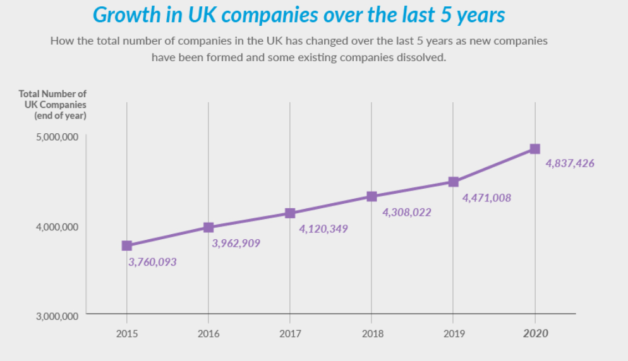
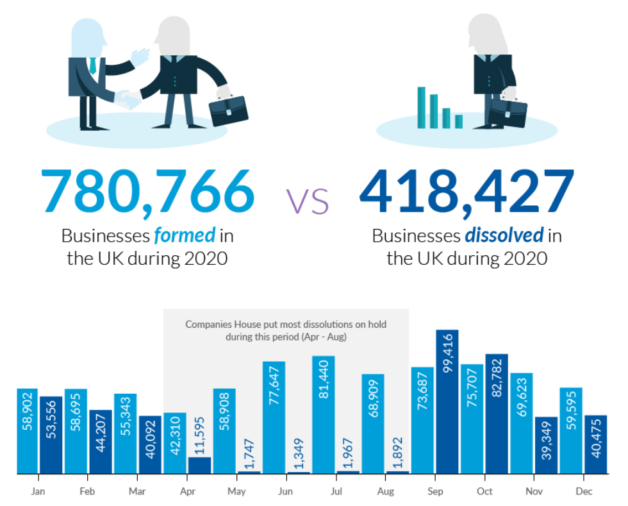
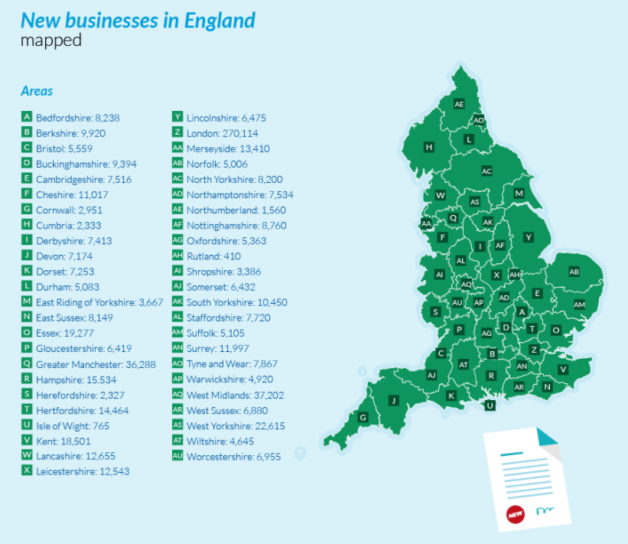
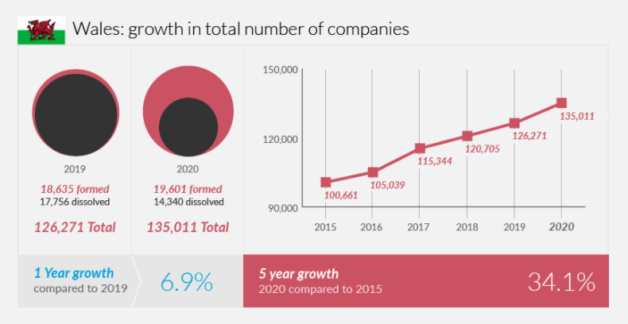
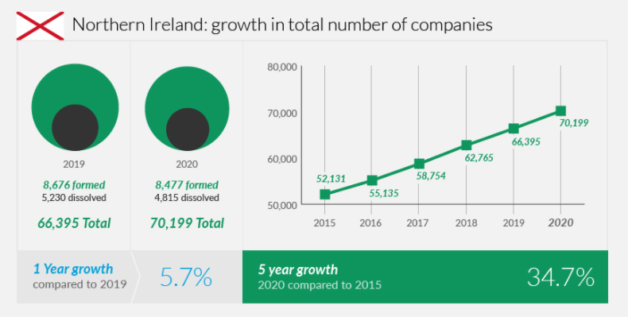

hi, this is very interesting, are you able to divulge more as to the methodology used in combining the ONS and Companies house data to arrives at these figures?
Hi Adam, we take the data Companies House publishes each month and run this through a process to match each company record with the ONS postocode directory. Doing this allows us to extend the Companies House data to include county, district and ward level data for each company.
Hi, I presume the data from Companies House is just for limited companies only? In other words, does it exclude sole traders, partnerships, other non-incorporated companies? Also would it be useful to report the net gain in businesses formed ie businesses formed minus businesses which ceased trading? And to report this as a time series ie year by year? Is the data from Companies House available as Open data – could a regular feed be set up?
The data represents all entities registered at Companies House, so indeed excludes sole traders, partnerships etc but includes LLPs, CICs etc. Each infographic we publish includes figures for incorporations and dissolutions, and the graphs then show the resulting changes in the total number of companies in the area. As well as including a historical comparison in the 2020 infographics, you can also navigate back to the infographics from previous years.